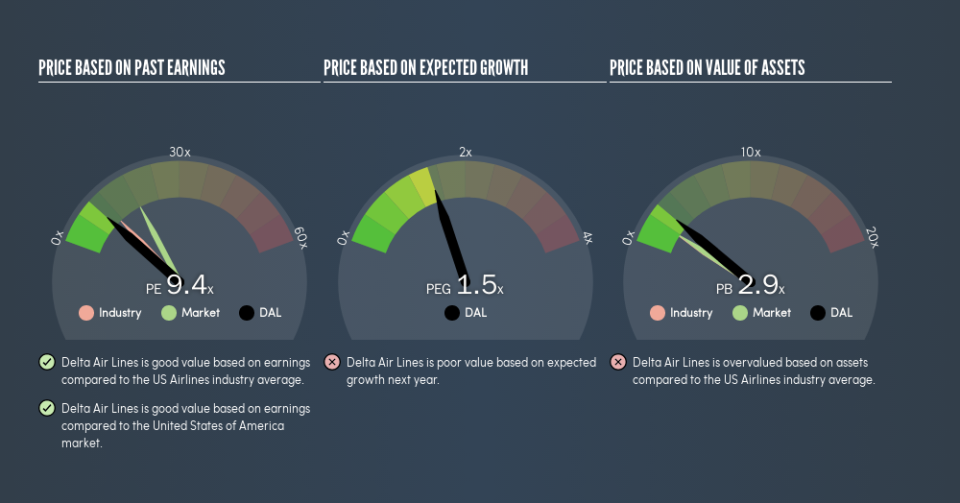Does Delta Air Lines, Inc. (NYSE:DAL) Have A Good P/E Ratio?

Want to participate in a short research study? Help shape the future of investing tools and you could win a $250 gift card!
The goal of this article is to teach you how to use price to earnings ratios (P/E ratios). We'll show how you can use Delta Air Lines, Inc.'s (NYSE:DAL) P/E ratio to inform your assessment of the investment opportunity. Delta Air Lines has a price to earnings ratio of 9.36, based on the last twelve months. That is equivalent to an earnings yield of about 11%.
Check out our latest analysis for Delta Air Lines
How Do I Calculate Delta Air Lines's Price To Earnings Ratio?
The formula for P/E is:
Price to Earnings Ratio = Price per Share ÷ Earnings per Share (EPS)
Or for Delta Air Lines:
P/E of 9.36 = $56.45 ÷ $6.03 (Based on the year to March 2019.)
Is A High Price-to-Earnings Ratio Good?
A higher P/E ratio means that investors are paying a higher price for each $1 of company earnings. That is not a good or a bad thing per se, but a high P/E does imply buyers are optimistic about the future.
How Growth Rates Impact P/E Ratios
Earnings growth rates have a big influence on P/E ratios. When earnings grow, the 'E' increases, over time. Therefore, even if you pay a high multiple of earnings now, that multiple will become lower in the future. So while a stock may look expensive based on past earnings, it could be cheap based on future earnings.
It's nice to see that Delta Air Lines grew EPS by a stonking 35% in the last year. But earnings per share are down 14% per year over the last five years.
Does Delta Air Lines Have A Relatively High Or Low P/E For Its Industry?
The P/E ratio indicates whether the market has higher or lower expectations of a company. If you look at the image below, you can see Delta Air Lines has a lower P/E than the average (11.2) in the airlines industry classification.
This suggests that market participants think Delta Air Lines will underperform other companies in its industry. Since the market seems unimpressed with Delta Air Lines, it's quite possible it could surprise on the upside. It is arguably worth checking if insiders are buying shares, because that might imply they believe the stock is undervalued.
Remember: P/E Ratios Don't Consider The Balance Sheet
Don't forget that the P/E ratio considers market capitalization. In other words, it does not consider any debt or cash that the company may have on the balance sheet. In theory, a company can lower its future P/E ratio by using cash or debt to invest in growth.
While growth expenditure doesn't always pay off, the point is that it is a good option to have; but one that the P/E ratio ignores.
Delta Air Lines's Balance Sheet
Delta Air Lines's net debt equates to 45% of its market capitalization. While it's worth keeping this in mind, it isn't a worry.
The Verdict On Delta Air Lines's P/E Ratio
Delta Air Lines trades on a P/E ratio of 9.4, which is below the US market average of 18.1. The EPS growth last year was strong, and debt levels are quite reasonable. If it continues to grow, then the current low P/E may prove to be unjustified. Since analysts are predicting growth will continue, one might expect to see a higher P/E so it may be worth looking closer.
When the market is wrong about a stock, it gives savvy investors an opportunity. As value investor Benjamin Graham famously said, 'In the short run, the market is a voting machine but in the long run, it is a weighing machine.' So this free report on the analyst consensus forecasts could help you make a master move on this stock.
But note: Delta Air Lines may not be the best stock to buy. So take a peek at this free list of interesting companies with strong recent earnings growth (and a P/E ratio below 20).
We aim to bring you long-term focused research analysis driven by fundamental data. Note that our analysis may not factor in the latest price-sensitive company announcements or qualitative material.
If you spot an error that warrants correction, please contact the editor at editorial-team@simplywallst.com. This article by Simply Wall St is general in nature. It does not constitute a recommendation to buy or sell any stock, and does not take account of your objectives, or your financial situation. Simply Wall St has no position in the stocks mentioned. Thank you for reading.

